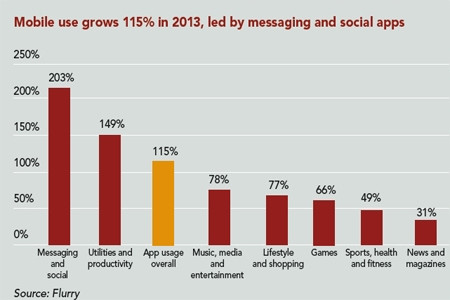
Mobile applications have changed the way people work, interact and socialise. According to analytics firm Flurry, mobile app usage surged by 115% in 2013, driven predominantly by messaging and social networking applications such as Snapchat, WhatsApp, WeChat, KakaoTalk and LINE.
Since mobile apps are changing the way people interact with the world and each other, Brainstorm spoke to three leading IT decision-makers to gain an insight into how this technology has changed their professional and personal lives.
"Since the spread of mobile apps, my life has improved and it's got a whole lot worse," says Steven Sengomago, GM at ThoughtWorks Kampala. "The growth of applications happened at the same time as a significant career shift for me, so it has definitely helped me to keep pace as I've needed to keep in touch with people, so I've appreciated that aspect a lot."
At the same time, he says the accessibility of mobile apps is a distraction. "The phone had become my window to the world. I became very antisocial, so I've had to consciously develop new habits - turning off my phone in a meeting, turning off mobile data as soon as I get home. I've developed defensive habits - not responding to work e-mails over weekends or on holiday. I'm available on the phone for emergencies, but don't automatically respond to e-mails."
He also says he constantly worries about running out of battery power, so he stores chargers everywhere. "Facebook is the biggest drain on juice, so I just don't use it."
Old-school
For work, he says his most used applications are his calendar and Evernote, but he's still very traditional and likes to make notes on paper as well. "I also use the calculator a lot - I'm getting worse at adding."
He reads books on Kindle, although he misses the feeling of paper under his fingers, but says that the biggest advantage is being able to read in the dark. And he shows his children how to play certain educational games like join the dots on his smartphone, but makes sure that they also develop the same skills in the physical world. "I'm very old-fashioned," he says.
"We don't use any official apps within our company," says Riaan Lucas, the Group ICT manager at Bidvest. "We also don't have a big tablet infrastructure yet. I must admit that I'm not a big fan of tablets at the moment as I see them as a third device and it takes a huge effort to make it worthwhile to use."
Apps are a lot like marriage; you have to put a lot of work into them to get them to work and even more to maintain them.
Riaan Lucas, Bidvest
He has a Samsung Galaxy Note 3 smartphone, and the only productivity app he uses is e-mail. "I find apps are a lot like marriage; you have to put a lot of work into them to get them to work and even more to maintain them. A lot of apps are created to resolve one issue within a huge big picture of problems."
Up to speed
He says many apps have conversion problems and don't fit into the official company strategy, which is the main reason that they don't use official apps in his organisation.
He doesn't use any applications for his own leisure, but uses Flipboard to keep in touch with technology news. He uses it in conjunction with Pocket, an app that stores links to view later, if he can't read an article right away. "The volume of information shared by Flipboard can be overwhelming and that's where Pocket comes in handy. The speed at which articles are shared is amazing. You're always up to speed with any developments on your subscribed categories."

He says that since the surge in smartphone usage, their office hours have extended without them noticing. At the same time, with the use of informative apps, the world has become a lot faster and more responsive. "Decisions can be made faster and based on more reliable data."
On the other hand, he believes the biggest drawback to using communications apps is that we're losing the ability to talk to each other. "I could be in a scenario where I can chat with a person without ever meeting or even speaking to that person. We're losing the personal touch we used to have, and people are simply a contact. The, 'how are you?' is now replaced with a status update somewhere on an app."
Connectivity issues
Simon Hudson, service director at ECS, says that for productivity, he tends to use tools that extend his desktop. "Anything that allows me to edit on the go, carry on with what I was doing while at my desk or access content when necessary are the apps that feature most. Pages and Numbers feature quite a bit and I'm really looking forward to the handoff features coming in iOS8 and OSX Yosemite."
He says that over and above that, he makes use of voice recordings to capture meetings and conversations so that he can participate fully and not be distracted by taking notes. He also uses tools like Clear to put together to-do lists.
"I use anything that extends my desktop onto my mobile devices and allows me to operate anywhere. I would add a number of remote access tools here, mainly to get back to a desktop or server when the mobile device apps just don't have the power, flexibility or functionality required to get something done. The iPad retina display is just about the right size for this."
As the result of the increase in mobile applications, Hudson spends far less time and money at bookshops and newsagents. "I have all my magazines, books and reading material delivered to my mobile devices," he says. "That said, I think I'm probably reading more as a result, as the breadth of choice is so much wider when individual tastes can be catered to as physical stores and borders are not necessary. Also, electronic goods tend to be a lot cheaper than physical ones."
He uses Facebook and Twitter to keep up with his wife and sons' social lives.
On the downside, he says that he has to carry around chargers and back-up power sources to supplement the device battery, but his main gripe is the availability and cost of connectivity in South Africa. "Our mobile data networks are oversubscribed and grossly overpriced, WiFi is not nearly as available as it is in Europe and North America, and where it is, it is also grossly overpriced."
Despite this, app development and usage continues to grow in South Africa and Africa. Our lives may have changed significantly as a result of the mobility revolution, but we are only at the beginning of the journey.
First published in the August 2014 issue of ITWeb Brainstorm magazine.
Share